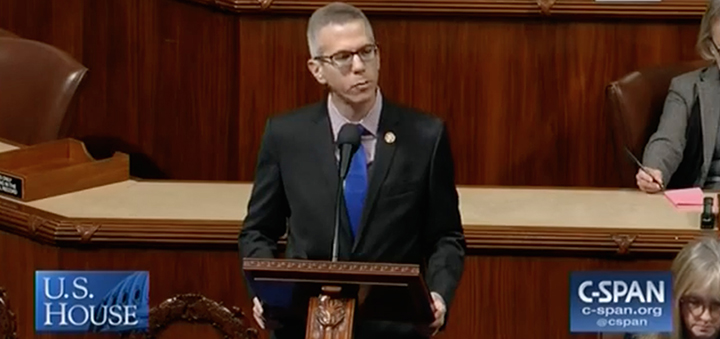NY-22 Minute: Brindisi Supports Wall, Not National Emergency By Luke Perry
Rep. Brindisi was “glad” Republicans and Democrats worked together to prevent a government shutdown. Brindisi said the spending “deal is not perfect, but it is an important step to help secure our border and keep our country safe.”
Brindisi then criticized President Trump’s declaration of a national emergency, claiming this “sets a dangerous precedent, undermines the role of Congress and our Constitution, and distracts from our ability to find serious, long-term solutions.”
The president seeks to use $3.6 billion in military construction money for 230 miles of additional barriers along the Southern border. Trump contends the Military Construction Act (1982) grants the Secretary of Defense ability to use military construction funds to undertake military construction projects not authorized in law. The Trump administration has stated that additional walling is necessary to support the 6,000 troops recently deployed to the Southern border.
“I am glad both sides were able to work together to prevent another government shutdown. Shutdowns hurt everyday Americans and threaten our country’s safety and security. This deal is not perfect, but it is an important step to help secure our border and keep our country safe. It’s also an example of what we can accomplish if we put aside our differences and work together to find common ground. That’s the kind of leadership our country deserves, and it’s the approach I’ll continue to take.”
Last month Brindisi called President Trump’s border security proposal a “golden opportunity” to avoid another government shutdown and agreed with Trump that the border is at a “dangerous level” and additional physical barriers should be part of the solution. Brindisi also claimed to have “broken with my party on these issues.”
This reflects Brindisi’s position during the 2016 campaign, when he pledged to “embrace the president’s call for more border security,” including a wall, a priority for the president, provided this was “part of comprehensive immigration reform.” (7:50 mark) At the time, Brindisi said the Senate passed comprehensive immigration reform in 2013, while the House passed nothing, and the lack of reform hurt NY-22 farmers due to a lack of skilled workers.
“ Declaring a national emergency would be a lawless act, a gross abuse of the power of the presidency, and a desperate attempt to distract from the fact that President Trump broke his core promise that to have Mexico pay for the wall. It would be another demonstration of President Trump’s naked contempt of the rule of the law and congressional authority.”
Brindisi’s criticism of Trump’s emergency declaration mirror Democratic Congressional leaders. Speaker Pelosi said “the precedent that the president is setting here is something that should be met with great unease and dismay by the Republicans” because future presidents could similarly declare national emergencies under questionable circumstances. Leader Schumer described Trump’s actions as a “tremendous mistake” and “lawless act” that constitute gross abuse of power.
Photo by Time
The House will likely pass a resolution rejecting Trump’s emergency declaration. Brindisi’s comments suggest he would support such a resolution.
Per Congressional rules, the Senate would then vote on the bill, which would face an uncertain outcome. If passed, the bill would go to the president, who would likely veto it. Congress would then need a two-thirds majority to override the veto.
In the meantime, the issue will go the courts, and construction may be precluded until a ruling.
Luke Perry (@PolSciLukePerry) is Chair and Professor of Government at Utica College
Read the NY-22 Minute for timely and comprehensive analysis NY-22 politics.







